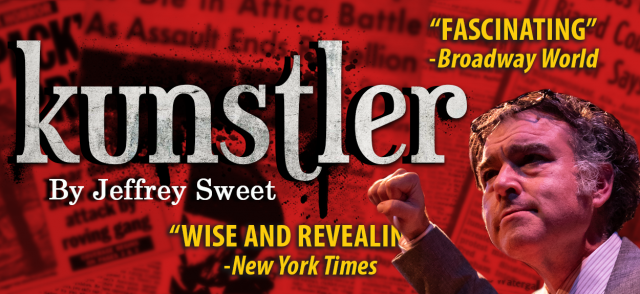
Into a college lecture hall in 1995 comes famous lawyer William Kunstler accompanied by Kerry, an exceptional young female law student. Outside can be heard protests against Kunstler speaking about his career. Despite Kerry’s first urge to confront him with objections to it and him, she introduces Kunstler. He takes over the podium and goes over all that made him celebrated, both positively and negatively. If anyone could be more ingratiating and sometimes irritating, right and righteous, or convinced that every accused person deserves due process than Kunstler, it has to be Sam Mossler portraying him. He has absolutely absorbed the part and he’s absorbing recounting every case the lawyer found so important. Kunstler’d be important if it were only for his involvement with the Freedom Riders, Abbie Hoffman vs. overbearing, overbeating Chicago police, The Catonsville Nine, the Attica prison riots. His accounts of Attica chill to the bone. Slides projected on the walls on sides of the curtained stage illustrate his narrative deeply. Mossler makes clear how upset was Kunstler at Governor Rockefeller’s refusal to come to Attica and to consider a list of points the prisoners wanted to parlay about. He still almost cries about Wounded Knee. Conspiracy by any in government is to be condemned, and Kunstler does it forcefully. As for Kunstler’s private tastes, Mossler shows them as a bit more conventional than not—about Woodstock, for example, and life in Greenwich Village. He apologizes for some of his personal life during his first marriage when he was often away from home and into temptation. He admits to being a hugger (and will later prove it, though not in an objectionable way). Anique Clements’ Kerry doesn’t seem to be much needed for a good while, but that changes toward the end. She’s spirited indeed, holding her own in argument with the “celebrity lawyer”—and he seems to like it, for the most part. Her boldness is one of the changes he talks about today in perceptions of things past that he dealt with. It’s a good ending that brings up concerns that still exist and, he suggests, should not. The play is part of FST’s Stage III series of plays that are tougher, hard hitting, and whose subjects are more controversial than MainStage or cabaret typically present. There’s usually, as in Kunstler, a minimum of scenery, props, and costuming, but what’s onstage is appropriate. Director Jason Cannon thus brings out the play’s subject and gets excellent acting of characters. They are well lit by Michael Cummings and the plot is enhanced by David Sabbagh’s sound and projections.
